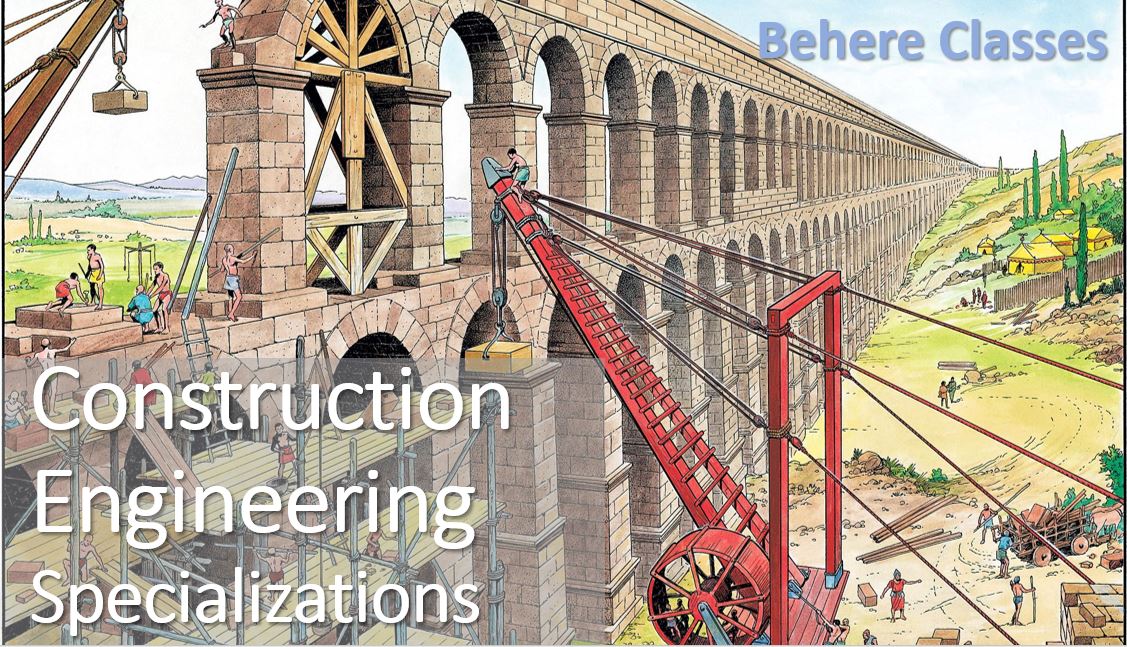Exploring Specializations in Construction Engineering
Sectors Encompassing Construction Engineering:
1. Residential Construction
2. Commercial Construction
3. Industrial Construction
4. Infrastructure and Civil Construction
5. Environmental and Sustainability Construction
6. Transportation Construction
7. Water Resource Management
8. Energy and Utilities Construction
9. Urban Development and Planning
10. Project Management and Consulting
11. Healthcare Construction
12. Educational Facilities Construction
13. Sports and Recreation Construction
14. Cultural and Heritage Construction
15. Government and Public Buildings Construction
16. Telecommunications Infrastructure
17. Military and Defense Construction
Duration & course Level:
1. Structural Engineering: Master's, 1-2 years
2. Project Management: Master's or Certification, 1-2 years or a few months
3. Construction Management: Master's, 1-2 years
4. Geotechnical Engineering: Master's, 1-2 years
5. Environmental Engineering: Master's, 1-2 years
6. Transportation Engineering: Master's, 1-2 years
7. Building Information Modeling (BIM): Master's or Certification, 1-2 years or a few months
8. Sustainable and Green Building: Master's, 1-2 years
9. Construction Materials Engineering: Master's, 1-2 years
10. Infrastructure Development: Master's, 1-2 years
11. Cost Estimation and Quantity Surveying: Master's or Certification, 1-2 years or a few months
12. Facilities Management: Master's or Certification, 1-2 years or a few months
13. Urban Planning and Development: Master's, 1-2 years
14. Risk Management in Construction: Master's or Certification, 1-2 years or a few months
15. Construction Safety Management: Master's or Certification, 1-2 years or a few months
Salary Package:
1. Structural Engineering: $70, 000 - $120, 000
2. Project Management: $75, 000 - $130, 000
3. Construction Management: $70, 000 - $125, 000
4. Geotechnical Engineering: $65, 000 - $110, 000
5. Environmental Engineering: $65, 000 - $110, 000
6. Transportation Engineering: $70, 000 - $115, 000
7. Building Information Modeling (BIM): $65, 000 - $110, 000
8. Sustainable and Green Building: $70, 000 - $120, 000
9. Construction Materials Engineering: $65, 000 - $105, 000
10. Infrastructure Development: $70, 000 - $120, 000
11. Cost Estimation and Quantity Surveying: $60, 000 - $100, 000
12. Facilities Management: $60, 000 - $100, 000
13. Urban Planning and Development: $65, 000 - $110, 000
14. Risk Management in Construction: $70, 000 - $115, 000
15. Construction Safety Management: $65, 000 - $110, 000
These salary ranges are approximate and can vary based on factors such as location (cost of living), industry, company size, and individual qualifications. Additionally, salaries may be higher for roles in high-demand areas or with specialized skills in emerging technologies like artificial intelligence, blockchain, or quantum computing.
Specializations:
1. Structural Engineering
2. Project Management
3. Construction Management
4. Geotechnical Engineering
5. Environmental Engineering
6. Transportation Engineering
7. Building Information Modeling (BIM)
8. Sustainable and Green Building
9. Construction Materials Engineering
10. Infrastructure Development
11. Cost Estimation and Quantity Surveying
12. Facilities Management
13. Urban Planning and Development
14. Risk Management in Construction
15. Construction Safety Management
Industrial Overview:
Construction engineering manages infrastructure projects, from planning to execution. It integrates project management, cost estimation, and safety compliance, using technologies like Building Information Modeling (BIM). Engineers collaborate closely with architects and contractors to deliver projects efficiently and sustainably, meeting modern urban development needs globally.
Industry/Field Future:
In construction engineering, innovation and sustainability are key drivers for the future. Advancements in robotics, AI, and green building materials are transforming the industry. Building Information Modeling (BIM) enhances project efficiency and collaboration. Engineers are crucial in developing resilient infrastructure to meet urbanization challenges while ensuring safety and regulatory compliance.

